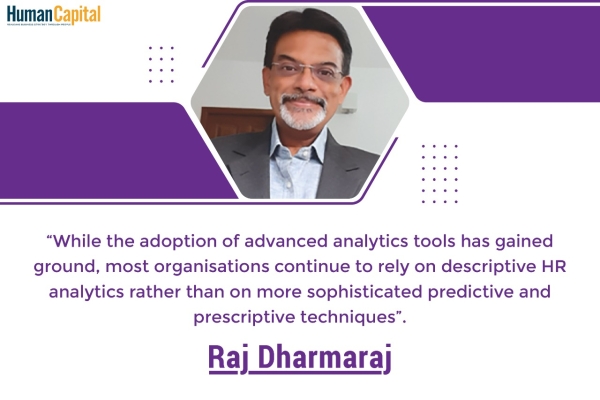In today's VUCA world, meritocracy has become the cornerstone of all successful business, and talent management is the best way to ensure that meritocracy thrives.
Talent is a highly overrated word, and whenever I think of talent management, the name that always crosses my mind is that of Vinod Kambli, the former cricketer. Kambli was a precocious talent. A schoolboy prodigy like his good friend Sachin Tendulkar, he had a great start to his Test career. But once he was bounced out by the West Indies in 1993, he was clueless as to what to do. He played his last Test, also his 17th, at the age of 23.
Before we chart out a holistic talent management plan, we should always remember that our endeavors should revolve around the need for human capital. The general two-pronged attitude towards identifying the need for human capital has been ineffective all this while. The first and the most commonly used option was to make no plans, anticipate nothing, and depend only on hiring. The problem with this approach was that it faded over a period of time as talent eroded. The second, mostly used by old and big corporations, focused mainly on succession planning.
For old corporations, talent management was a highly dysfunctional term because they were accustomed to operating in a highly predictable world, where business was not as competitive as it is now. Young companies are now taking a fundamentally new approach to talent management since they operate in a very hostile environment. For a successful talent management program, it is very important to have a vision, and the onus lies with the senior management to chart out a well‑documented path aligned with the company’s growth philosophy. It starts with a bit of soul searching by analyzing:
1. Mission: Why do we exist?
2. Vision: Where do we want to be?
3. Core Values: How we will behave?
4. Core Strategies: Where will we focus?
5. Priorities: What are we doing (both operational and strategically)?
The guiding principles while driving talent management are:
1. Creating values: Meritocracy remains the focus to create a robust Performance Management System (PMS). It certainly helps in strengthening the values around which you grow in an organization. In such a scenario, setting up basic things like creating KRAs—which are aligned to the individual’s role in the company—becomes important. We must also carefully design KRAs keeping in mind the larger corporate strategy, as they become the reference point for talent management.
2. Create opportunities: We often make the mistake of believing that top talent is motivated and sensitive to compensation, which is certainly a myth. I strongly believe that compensation cannot be the sole hook for attracting high-end talent, who in the long run bestow greatness upon the organization. Top talent looks for opportunities to grow and we need to create those opportunities for them.
3. Create management involvement: We need a holistic approach to talent management and successful companies have realized that this needs to have broad ownership. We need to create involvement of the senior management including that of the CEO to build successful talent management programs.
In the end it is about aligning the organisation’s vision with that of the employees so that the outcome achieved can be mutually beneficial to both.

Has COVID-19 forever changed the way we live and work?
Trending
-
SBI General Insurance Launches Digital Health Campaign
-
CredR Rolls Out 'Life Happens' Leave For Its Employees
-
Meesho Announces 30-Week Gender-Neutral Parental Leave Policy
-
Microsoft Unveils Tech Resilience Curriculum To Foster An Inclusive Future
-
60% Indian Professionals Looking For Job Change Due To COVID: Survey
-
SpringPeople And Siemens Collaborate For Digital Transformation Push
-
86% Professionals Believe Hybrid Work Is Essential For Work Life Balance: Report
-
Almost 1 In Every 3 People's Personal Life Affected Due To Work Stress
-
Meesho Rolls Out Reset And Recharge Policy For Employees
-
80% Of Talent Leaders & Academics Say Pandemic Changed Skill Needs For Youth: Report
-
Hero Electric Rolls Out 'Hero Care' Program For Employees
-
Human Capital In Collaboration With ASSOCHAM Hosts Virtual Conference
-
IKEA India, Tata STRIVE Collaborate To Create Employability And Entrepreneurship Opportunities
-
SAP India, Microsoft Launch Tech Skilling Program for Young Women
-
DXC Technology, NASSCOM Collaborate For Employability Skills Program
-
Lenskart To Hire Over 2000 Employees Across India By 2022
-
Mindtree Launches Learn-and-Earn Program
-
Tata AIA Extends 'Raksha Ka Teeka' To Its Employees
-
Swadesh Behera Is The New CPO Of Titan
-
NetConnect Global Plans To Recruit 5000 Tech Professionals In India
-
Hubhopper Plans To Hire 60% Of Indian Podcasters By 2022
-
Corporate India Needs More Women In Leadership Roles: Report
-
Aon to Invest $30 Million and Create 10,000 Apprenticeships by 2030
-
Tech Mahindra Launches ‘Gift a Career’ Initiative for Upskilling of Youth
-
40% Women Prefer Flexible Working Options in Post-COVID World: Survey
-
3 out of 4 companies believe they can effectively hire employees virtually: Report
-
Vodafone , CGI and NASSCOM Foundation launch digital skills platform
-
Odisha: Bank, postal employees to deliver cash for elderly, differently-abled persons
-
Skill India launches AI-based digital platform for "Skilled Workforce"
-
Hiring activity declines 6.73% in first quarter: Survey
-
70% startups impacted by COVID-19 pandemic
-
Bajaj Allianz Life ropes in Santanu Banerjee as CHRO
-
Over 70 Percent MSMEs look at cutting jobs to sustain businesses
-
93 Per Cent employees stressed about returning to office post-lockdown
-
Johnson & Johnson India announces family benefits for same gender partners
-
Indian firms turning friendly towards working mothers
-
Welspun India names Rajendra Mehta as new CHRO
-
Wipro partners with NASSCOM to launch Future Skills platform



Human Capital is niche media organisation for HR and Corporate. Our aim is to create an outstanding user experience for all our clients, readers, employers and employees through inspiring, industry-leading content pieces in the form of case studies, analysis, expert reports, authored articles and blogs. We cover topics such as talent acquisition, learning and development, diversity and inclusion, leadership, compensation, recruitment and many more.
Subscribe Now












































Comment